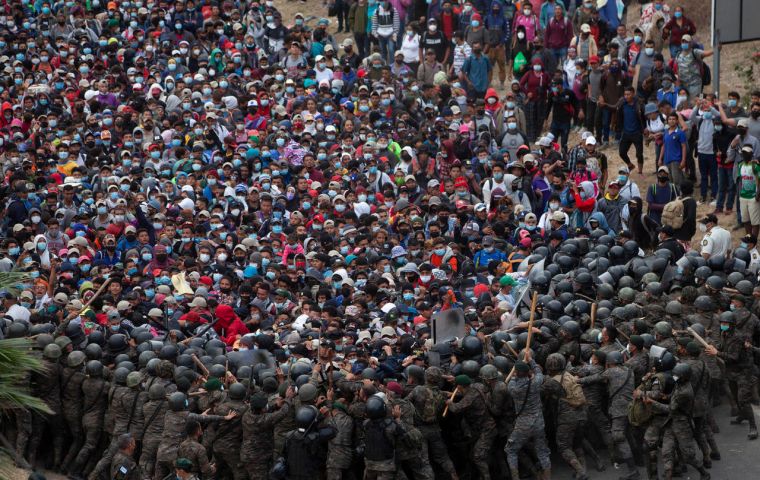MercoPress. South Atlantic News Agency
Guatemalan forces beat back to Honduras a migrant caravan heading for the US
 Guatemala said the road in the eastern part of the country reopened to traffic after troops with batons and plastic shields closed in on the migrants
Guatemala said the road in the eastern part of the country reopened to traffic after troops with batons and plastic shields closed in on the migrants While the Mexican government militarized its borders, Guatemalan security forces on Monday cleared a road of hundreds of people in a mostly Honduran migrant caravan that had camped out overnight when authorities barred it from advancing toward the United States.
The Guatemalan government said the road in the eastern part of the country reopened to traffic after troops with batons and plastic shields closed in on the migrants just beyond the village of Vado Hondo, about 56 km from border crossings into Honduras and El Salvador.
With soldiers looking on, groups of migrants, many with young children and carrying bags and luggage, then waited in lines to board buses returning them to the El Florido border crossing with Honduras, video footage on social media showed.
The removal of the large group was the latest effort by Guatemalan authorities to break up the caravan, which authorities said numbered close to 8,000 people, within hours of its departure for the United States from Honduras last week.
About 2,000 of the migrants installed themselves on the road after they clashed with Guatemalan security forces on Sunday during a failed effort to make their way past them.
Ruben Tellez, a spokesman for Guatemala’s military, later defended soldiers’ use of force, describing it as minimal and proportionate.
“Their right to migrate is being respected so long as they prove that their entry into the country complies with migratory and sanitary requirements,” Tellez said referring to valid identification documents as well as a negative COVID-19 test in the past 48 hours.
Many of the migrants say they are fleeing poverty and lawlessness in a region rocked by the coronavirus pandemic and two devastating hurricanes in November.
Mexican President Andres Manuel Lopez Obrador on Monday warned migrants not to try to enter countries by force, and said he was in touch with both the outgoing and incoming U.S. administrations over the migrant caravan.
Lopez Obrador said he was hopeful that Biden would carry out an immigration reform and work with Mexico and Central America on a plan that could provide alternatives to migration.




Top Comments
Disclaimer & comment rulesCommenting for this story is now closed.
If you have a Facebook account, become a fan and comment on our Facebook Page!